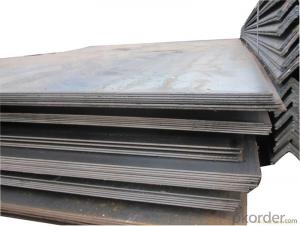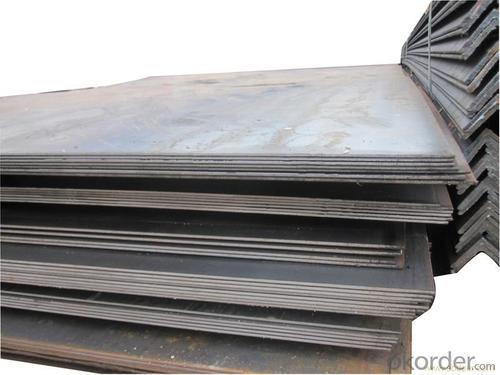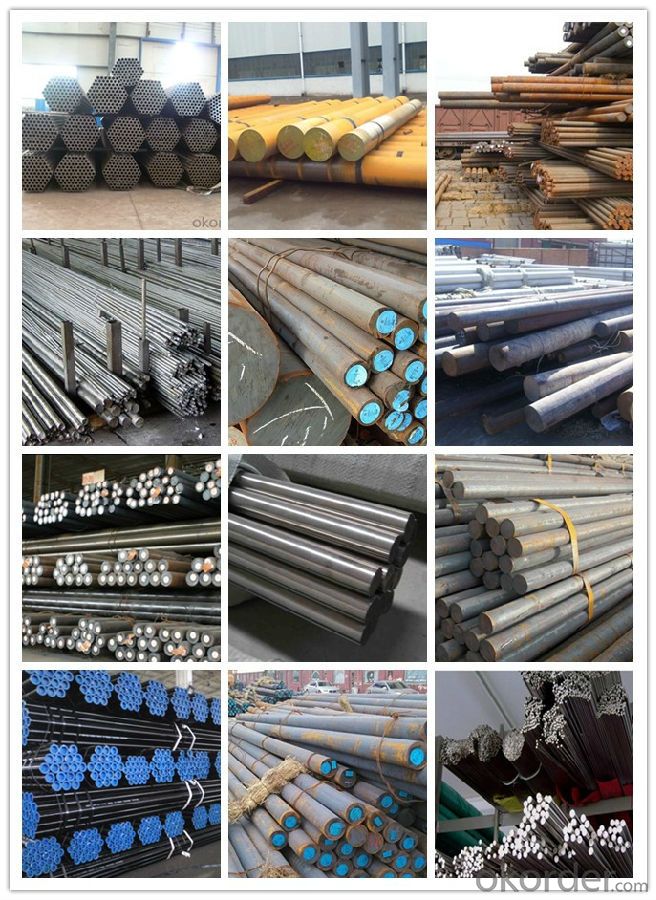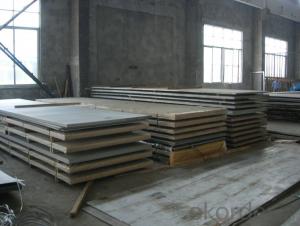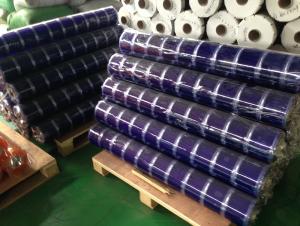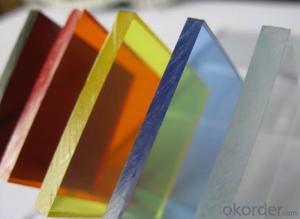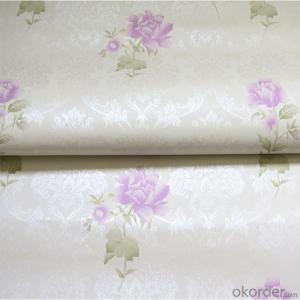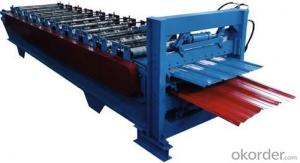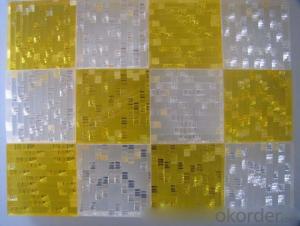Steel Sheets P20 / 1.2311 Plastic Mould Steel
- Loading Port:
- China main port
- Payment Terms:
- TT OR LC
- Min Order Qty:
- 30 m.t.
- Supply Capability:
- 10000 m.t./month
OKorder Service Pledge
OKorder Financial Service
You Might Also Like
Specification
1.2311 plastic mould steel description:
Chemical Composition:
C | Si | Mn | Cr | Mo | P | S |
0.28~0.40 |
0.20~0.80 |
0.60~1.00 |
1.40~2.00 |
0.30~0.55 |
≤0.030 |
≤0.030 |
Specification(Customer requested size):
Thickness: 16/18/20/25/30/35...380/385/390/395/400MM
Width: 185/225/250/255/260.../1800/2000/2200MM
Length: 2000~5800MM
Material Character:
Good mechanical property, make surface have equal harness after deal with it. Nice polishing, roughness on the surface, deal with induration in advance. It can be used directly after the mould machined, deal with surface induration necessity.
Application:
Used for various large-sized or medium-sized precision plastic mould and low melting point alloy parts, like: tin, zinc and lead alloy casting mould.
Product show
Workshop show
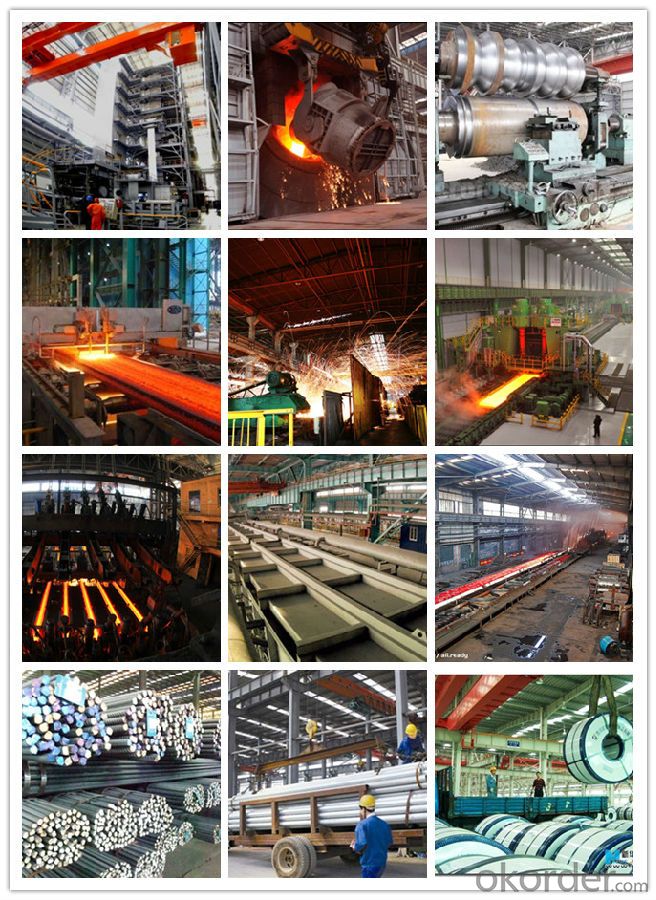
Shipping
1. FedEx/DHL/UPS/TNT for samples, Door-to-Door;
2. By Air or by Sea for batch goods, for FCL; Airport/ Port receiving;
3. Customers specifying freight forwarders or negotiable shipping methods!
Delivery Time: 3-7 days for samples; 5-25 days for batch goods.
Payment Terms
1.Payment: T/T, L/C, Western Union, MoneyGram,PayPal; 30% deposits; 70% balance before delivery.
2.MOQ: 1pcs
3.Warranty : 3 years
4.Package Informations: 1) EXPORT, In 20 feet (GW 25 ton) or 40 feet Container (GW 25 ton)
2)as customer's requirement
Why choose us?
(1) The leading exporter in China special steel industry.
(2) Large stocks for various sizes, fast delivery date.
(3) Good business relationship with China famous factories.
(4) More than 7 years steel exporting experience.
(5) Good after-sales service guarantee.
- Q: How does special steel perform in cryogenic fatigue resistance?
- Special steel is known for its exceptional performance in cryogenic fatigue resistance. Cryogenic fatigue refers to the deterioration of a material's structural integrity under repeated loading and unloading at extremely low temperatures. Special steel, also known as high-performance or high-strength steel, exhibits superior resistance to cryogenic fatigue compared to conventional steels. The unique composition and microstructure of special steel contribute to its enhanced cryogenic fatigue resistance. Special steels are typically alloyed with elements such as nickel, chromium, and molybdenum, which improve their mechanical properties, including strength and toughness, even at low temperatures. These alloying elements enable the steel to maintain its integrity and resist crack initiation and propagation, which are common failure mechanisms in cryogenic environments. Furthermore, the microstructure of special steel is carefully controlled during the manufacturing process to ensure optimal performance in cryogenic conditions. The fine-grained structure of special steel reduces the susceptibility to fatigue cracks, as it provides a more uniform distribution of stress and strain throughout the material. This helps prevent the formation of localized stress concentrations, which can lead to crack initiation and subsequent failure. In addition to its composition and microstructure, special steel undergoes rigorous testing and quality control measures to ensure its cryogenic fatigue resistance. Various industry standards and specifications exist to evaluate the performance of special steel in cryogenic conditions, such as the ASTM E466 test method. These tests simulate the cyclic loading and unloading that the material may experience in cryogenic environments and provide valuable data on its fatigue life and durability. Overall, special steel demonstrates excellent cryogenic fatigue resistance due to its unique composition, controlled microstructure, and rigorous testing. Its ability to withstand repeated loading and unloading at extremely low temperatures makes it a preferred choice for applications in industries such as aerospace, energy, and cryogenic storage.
- Q: Can special steel be used for automotive engine components?
- Yes, special steel can be used for automotive engine components. Special steel, such as high-strength alloys or stainless steel, can offer superior mechanical properties, corrosion resistance, and heat resistance, making it suitable for demanding engine applications.
- Q: What are the different methods of surface anodizing for special steel?
- There are several methods of surface anodizing for special steel, including electrochemical anodizing, plasma electrolytic oxidation (PEO), and chromic acid anodizing. Each method has its own advantages and suitability for different steel types and desired outcomes. Electrochemical anodizing involves immersing the steel in an electrolyte solution and applying an electric current to form an oxide layer on the surface. PEO utilizes a high-voltage electrical discharge to create a thicker and more durable anodized layer. Chromic acid anodizing, on the other hand, utilizes a mixture of chromic acid and sulfuric acid to achieve corrosion protection and improved surface properties. The choice of method depends on the specific requirements and characteristics of the special steel being anodized.
- Q: How is precipitation-hardening steel used in the aerospace industry?
- Precipitation-hardening steel, also known as PH steel, is extensively used in the aerospace industry due to its exceptional strength-to-weight ratio and excellent corrosion resistance. This type of steel undergoes a heat treatment process that enables the formation of fine precipitates within its structure, resulting in improved mechanical properties. In aerospace applications, precipitation-hardening steel is commonly utilized for manufacturing critical components such as landing gear, engine parts, and structural elements. Its high strength and durability allow for the construction of lighter and more fuel-efficient aircraft, enhancing overall performance and safety in the aerospace sector.
- Q: What are the different heat treatment methods for special steel?
- There are several heat treatment methods for special steel, including annealing, quenching, tempering, and normalizing. Annealing involves heating the steel to a specific temperature and then slowly cooling it to improve its machinability and reduce internal stresses. Quenching is a rapid cooling process that makes the steel harder and more brittle, but also increases its strength. Tempering is a heat treatment process that involves reheating quenched steel to a specific temperature and then cooling it again to improve its toughness and reduce brittleness. Normalizing is another heat treatment method that involves heating the steel to a specific temperature and then cooling it in still air to improve its mechanical properties and refine its grain structure.
- Q: What are the different methods of strengthening special steel?
- There are several methods of strengthening special steel, each with its own advantages and applications. One common method is through heat treatment, which involves heating the steel to a specific temperature and then cooling it rapidly or slowly, depending on the desired outcome. This can include processes like quenching, tempering, and annealing, which modify the microstructure of the steel to enhance its mechanical properties. Another method is alloying, where different elements are added to the steel to improve its strength. For example, adding elements like chromium, nickel, or molybdenum can increase the steel's resistance to corrosion, while elements like vanadium or tungsten can enhance its hardness and wear resistance. Cold working is another technique used to strengthen special steel, which involves deforming the steel at room temperature through processes like rolling, forging, or drawing. This helps to align the steel's crystalline structure, increasing its strength and hardness. Additionally, surface treatments can be applied to special steel to improve its strength. These can include techniques like carburizing, nitriding, or plating, which introduce a hardened layer or coating on the surface of the steel to enhance its wear resistance and durability. Each of these methods has its own advantages and can be tailored to suit specific applications and requirements. By combining various strengthening techniques, special steel can be customized to meet a wide range of industrial needs, making it a versatile and reliable material.
- Q: What are the requirements for special steel used in high-temperature applications?
- To ensure optimal performance and durability in extreme conditions, special steel utilized in high-temperature applications, such as aerospace, power generation, and oil and gas industries, must fulfill specific criteria. Some essential requirements for this type of steel include: 1. Excellent strength and resistance to deformation at elevated temperatures are vital for maintaining structural integrity and preventing failure or deformation under extreme heat. 2. High resistance to oxidation is necessary to prevent the formation of oxides on the steel's surface, which can weaken its structure and compromise its performance. 3. Exceptional creep resistance is essential to prevent excessive deformation or failure over time caused by constant stress at high temperatures. 4. Good thermal stability allows the steel to retain its mechanical properties even after prolonged exposure to high temperatures, ensuring reliable and consistent performance. 5. In addition to oxidation, the steel must also possess good corrosion resistance to protect against various corrosive agents present in the environment, such as acids, alkalis, and salts. 6. High resistance to thermal fatigue is crucial to prevent cracking, fracturing, or failure due to repeated heating and cooling cycles. 7. Low thermal expansion minimizes dimensional changes and maintains dimensional stability under high-temperature conditions, preventing unwanted distortions or misalignments. 8. Good weldability facilitates the fabrication and joining of components, enabling the construction of complex structures and assemblies required in high-temperature environments. By meeting these requirements, special steel used in high-temperature applications can withstand extreme heat, preserve its structural integrity, and deliver reliable performance in demanding conditions.
- Q: How does tool steel maintain its hardness at high temperatures?
- Tool steel maintains its hardness at high temperatures due to its high carbon content and the presence of alloying elements such as tungsten, molybdenum, and vanadium. These elements form carbides, which enhance the steel's ability to retain its hardness even under extreme heat. Additionally, the steel's fine grain structure and heat treatment processes contribute to its high temperature hardness retention.
- Q: How does special steel perform in high-stress applications?
- Special steel performs exceptionally well in high-stress applications due to its unique properties and composition. It offers superior strength, toughness, and durability, allowing it to withstand extreme conditions without deformation or failure. Additionally, special steel exhibits excellent resistance to corrosion, heat, and wear, making it an ideal choice for challenging environments. Its high performance and reliability make it a preferred material for critical components in industries such as aerospace, automotive, and oil and gas.
- Q: What are the requirements for special steel used in chemical processing?
- The requirements for special steel used in chemical processing are generally more stringent compared to regular steel due to the harsh and corrosive nature of the chemicals involved. Some of the key requirements for special steel in chemical processing include: 1. Corrosion resistance: Special steel used in chemical processing must exhibit high resistance to corrosion from acids, alkalis, and other corrosive chemicals. This is achieved by adding alloying elements such as chromium, nickel, and molybdenum, which form a protective oxide layer on the surface of the steel, preventing it from reacting with the chemicals. 2. High temperature resistance: Chemical processing often involves high-temperature reactions. Therefore, special steel used in this industry must have excellent heat resistance to maintain its strength and structural integrity at elevated temperatures. This is achieved by adding elements like chromium, nickel, and tungsten, which help in maintaining the stability of the steel at high temperatures. 3. Mechanical strength: Special steel used in chemical processing should possess sufficient mechanical strength to withstand the pressures and loads encountered in the process equipment. This requirement is met by adding alloying elements such as manganese, silicon, and carbon, which enhance the steel's strength and toughness. 4. Weldability: Weldability is a crucial requirement for special steel used in chemical processing as it allows for easy fabrication and installation of process equipment. Special steel with good weldability ensures strong and reliable joints, which are essential for the safe and efficient operation of chemical plants. 5. Resistance to stress corrosion cracking: Stress corrosion cracking is a significant concern in chemical processing environments. Therefore, special steel used in this industry should have good resistance to stress corrosion cracking, which is achieved by carefully selecting the alloying elements and controlling the material's microstructure. 6. Cleanliness: Special steel used in chemical processing should be free from impurities and have a low content of harmful elements that could contaminate the process or react with the chemicals. This necessitates strict quality control measures during steel production to ensure the desired cleanliness and purity. Meeting these requirements ensures that special steel used in chemical processing can withstand the aggressive chemical environment, high temperatures, and mechanical stresses encountered in the industry, leading to safe and reliable operation of the process equipment.
Send your message to us
Steel Sheets P20 / 1.2311 Plastic Mould Steel
- Loading Port:
- China main port
- Payment Terms:
- TT OR LC
- Min Order Qty:
- 30 m.t.
- Supply Capability:
- 10000 m.t./month
OKorder Service Pledge
OKorder Financial Service
Similar products
Hot products
Hot Searches
Related keywords
